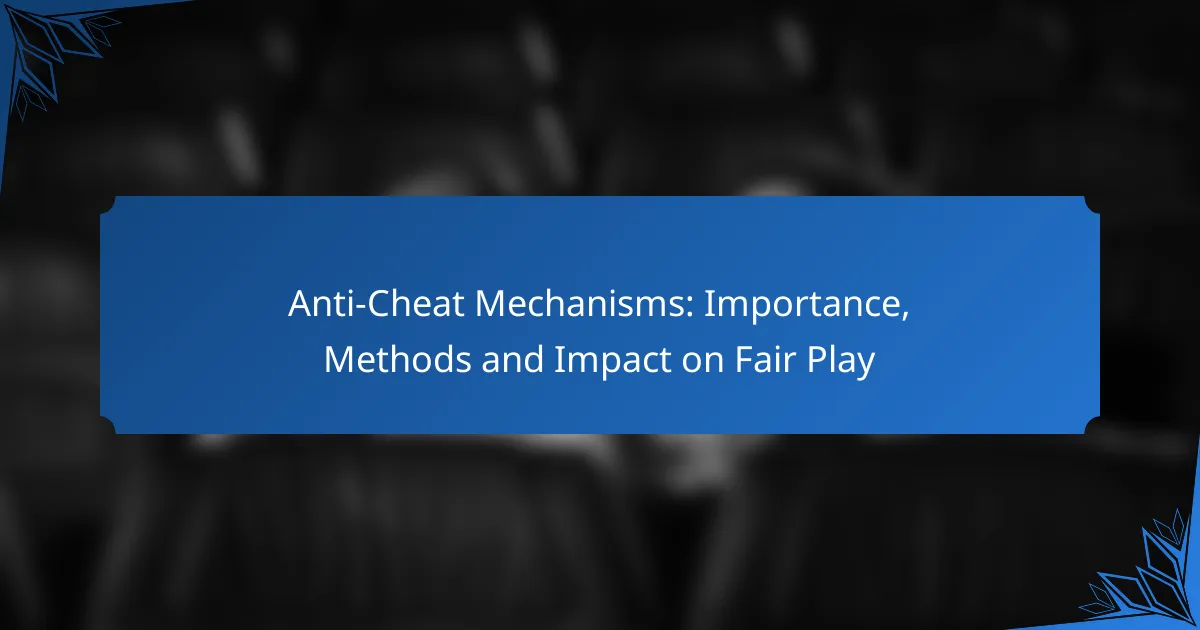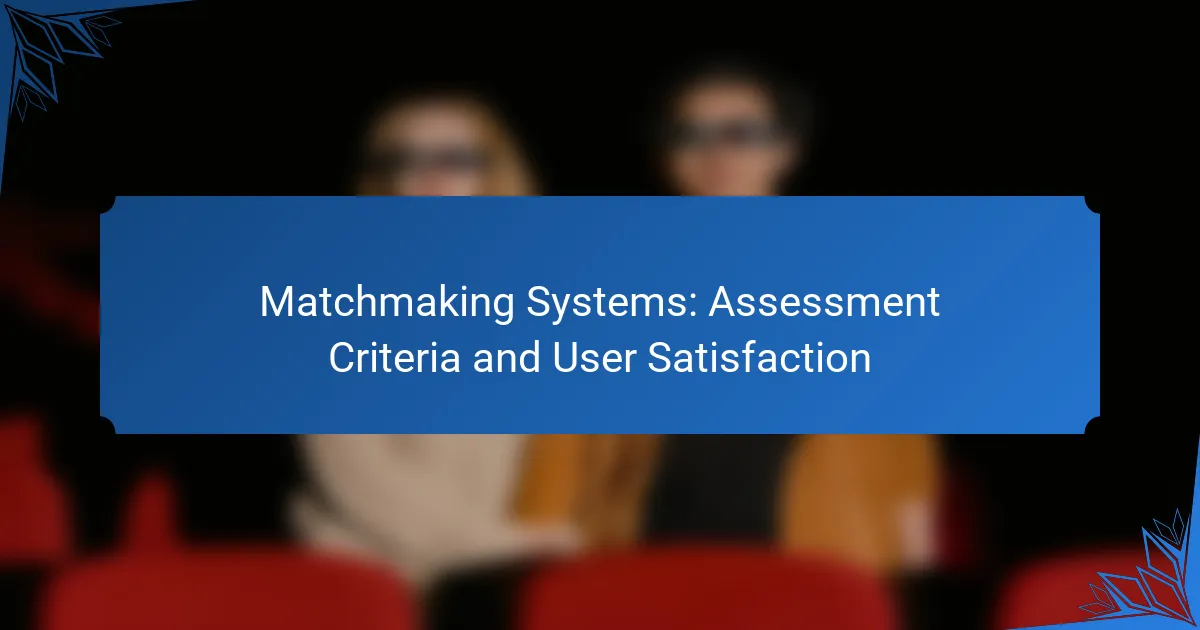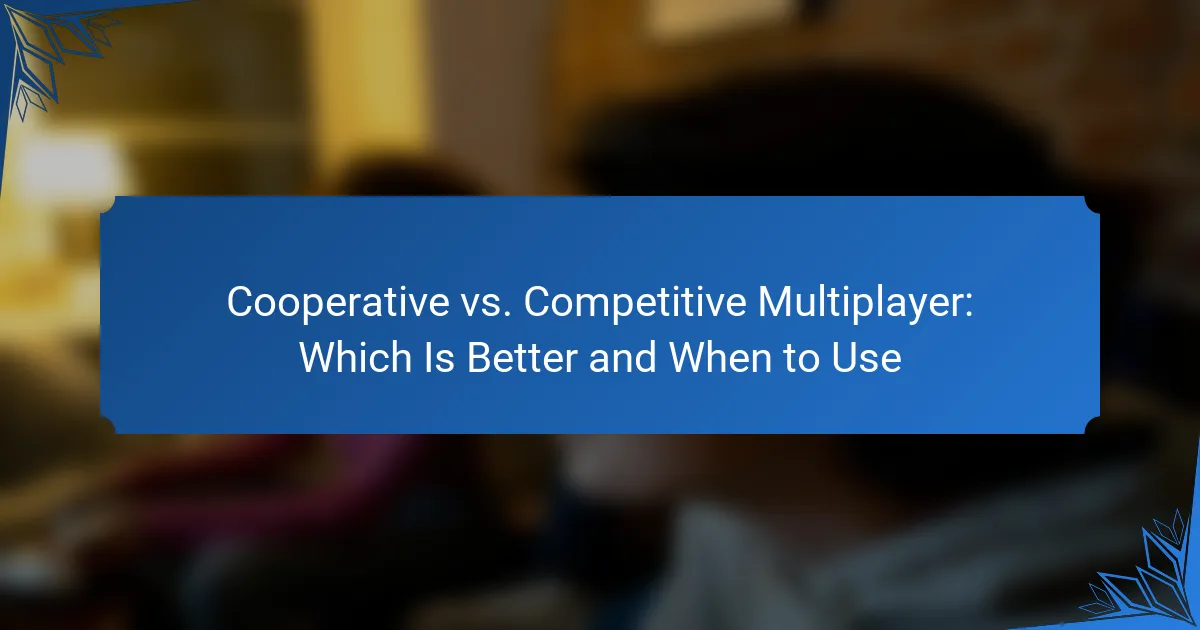Anti-cheat mechanisms are essential in online gaming, as they uphold the integrity of the competition by preventing cheating and ensuring a fair experience for all players. By employing a combination of techniques such as server-side detection and behavioral analysis, these systems work to maintain a balanced gaming environment, ultimately enhancing player satisfaction and trust in the game.

Why are anti-cheat mechanisms important in online gaming?
Anti-cheat mechanisms are crucial in online gaming as they ensure a level playing field by preventing cheating and unfair advantages. These systems help maintain the integrity of games, fostering a competitive environment where players can engage fairly.
Preservation of fair play
Preserving fair play is essential for the enjoyment and competitiveness of online games. Anti-cheat mechanisms detect and prevent cheating methods, such as aimbots or wallhacks, which can skew the results of matches. By enforcing rules consistently, these systems help ensure that skill, strategy, and teamwork dictate outcomes rather than illicit advantages.
Common methods include real-time monitoring of player behavior and the use of algorithms to identify suspicious activity. Developers often implement regular updates to adapt to new cheating techniques, ensuring that the integrity of the game remains intact.
Enhancement of player trust
Player trust is vital for the longevity of any online gaming community. When players know that anti-cheat measures are in place, they are more likely to invest time and resources into the game. This trust is built through transparency in how cheating is handled and the consequences for offenders.
For instance, many games publicly share statistics on bans and cheating incidents, reinforcing the commitment to a fair gaming experience. This openness not only deters potential cheaters but also reassures honest players that their efforts will be recognized and rewarded.
Protection of game integrity
Game integrity refers to the overall quality and reliability of the gaming experience. Anti-cheat mechanisms play a critical role in protecting this integrity by ensuring that all players adhere to the same rules. This protection helps maintain the game’s reputation and can influence its success in the competitive gaming market.
Developers must balance stringent anti-cheat measures with user experience, as overly aggressive systems can inadvertently penalize legitimate players. Regular updates and community feedback are essential for fine-tuning these mechanisms, ensuring they effectively target cheats without disrupting genuine gameplay.
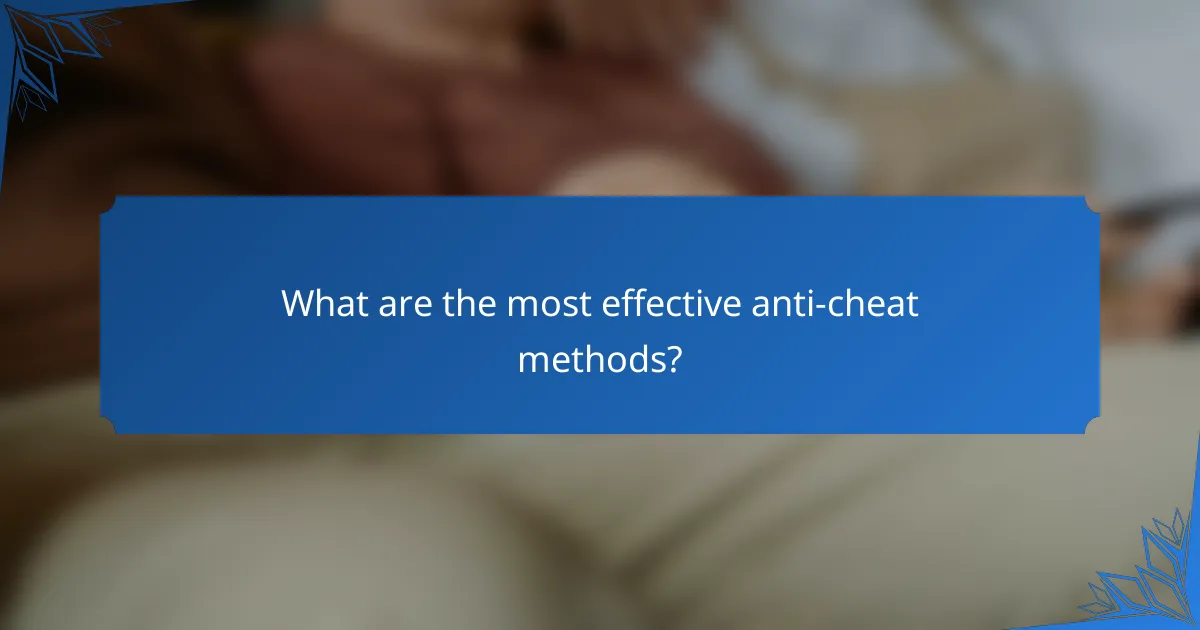
What are the most effective anti-cheat methods?
The most effective anti-cheat methods combine various techniques to detect and prevent cheating in online games. These methods include server-side detection, client-side validation, behavioral analysis, and machine learning algorithms, each playing a crucial role in maintaining fair play.
Server-side detection
Server-side detection involves monitoring game data and player actions from the server’s perspective. This method can identify anomalies, such as unusual score patterns or impossible player movements, that suggest cheating.
By analyzing data in real-time, game developers can implement immediate countermeasures, such as banning players or adjusting game mechanics. However, this method requires robust server infrastructure to handle the increased data processing demands.
Client-side validation
Client-side validation checks the game’s integrity on the player’s device. This method ensures that the game files have not been tampered with and that the player’s actions align with the game’s rules.
While effective in detecting certain types of cheats, client-side validation can be circumvented by skilled hackers. Therefore, it is often used in conjunction with server-side detection for enhanced security.
Behavioral analysis
Behavioral analysis focuses on monitoring player behavior to identify patterns indicative of cheating. By establishing baselines for normal gameplay, developers can flag players whose actions deviate significantly from these norms.
This method can be particularly useful in detecting aimbots or wallhacks, where players exhibit unnatural precision or awareness. However, it requires continuous data collection and analysis, which can raise privacy concerns.
Machine learning algorithms
Machine learning algorithms leverage large datasets to identify cheating patterns and adapt to new cheating techniques over time. These algorithms can analyze vast amounts of gameplay data to recognize subtle indicators of cheating that traditional methods might miss.
Implementing machine learning can significantly enhance the effectiveness of anti-cheat systems, but it requires substantial computational resources and ongoing training to remain effective against evolving cheats.
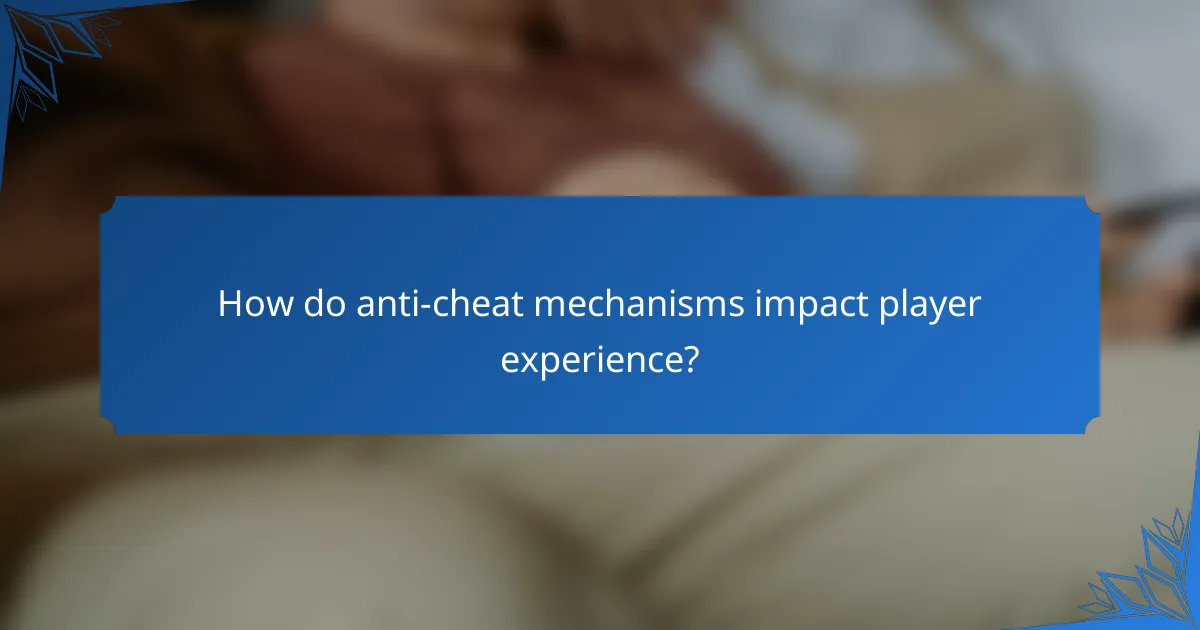
How do anti-cheat mechanisms impact player experience?
Anti-cheat mechanisms significantly enhance player experience by ensuring a fair and competitive gaming environment. These systems reduce cheating incidents, improve competitive balance, and can sometimes lead to false positives that may affect legitimate players.
Reduction of cheating incidents
Anti-cheat mechanisms are designed to detect and prevent cheating, thereby reducing the number of players who gain unfair advantages. Common methods include software that scans for known cheats, monitoring player behavior for anomalies, and employing machine learning algorithms to identify suspicious activities.
For example, many online games utilize real-time monitoring systems that can flag or ban players who exhibit abnormal performance metrics, such as unusually high accuracy or rapid reaction times. This proactive approach helps maintain integrity within the gaming community.
Improvement of competitive balance
By minimizing cheating, anti-cheat mechanisms foster a more level playing field, allowing players to compete based on skill rather than illicit advantages. This balance is crucial for maintaining player engagement and satisfaction, as it encourages fair competition.
In competitive gaming, where rankings and rewards are at stake, a fair environment can lead to increased player retention and a more vibrant community. Players are more likely to invest time and resources into games where they feel their efforts will be rewarded fairly.
Potential for false positives
While anti-cheat systems are essential for fair play, they can sometimes mistakenly identify legitimate players as cheaters, resulting in false positives. This can lead to unwarranted bans or penalties, negatively impacting the experience of honest players.
To mitigate this issue, developers often refine their detection algorithms and provide players with avenues to appeal bans. Transparency in the detection process and clear communication about what constitutes cheating can help alleviate concerns among the player base.
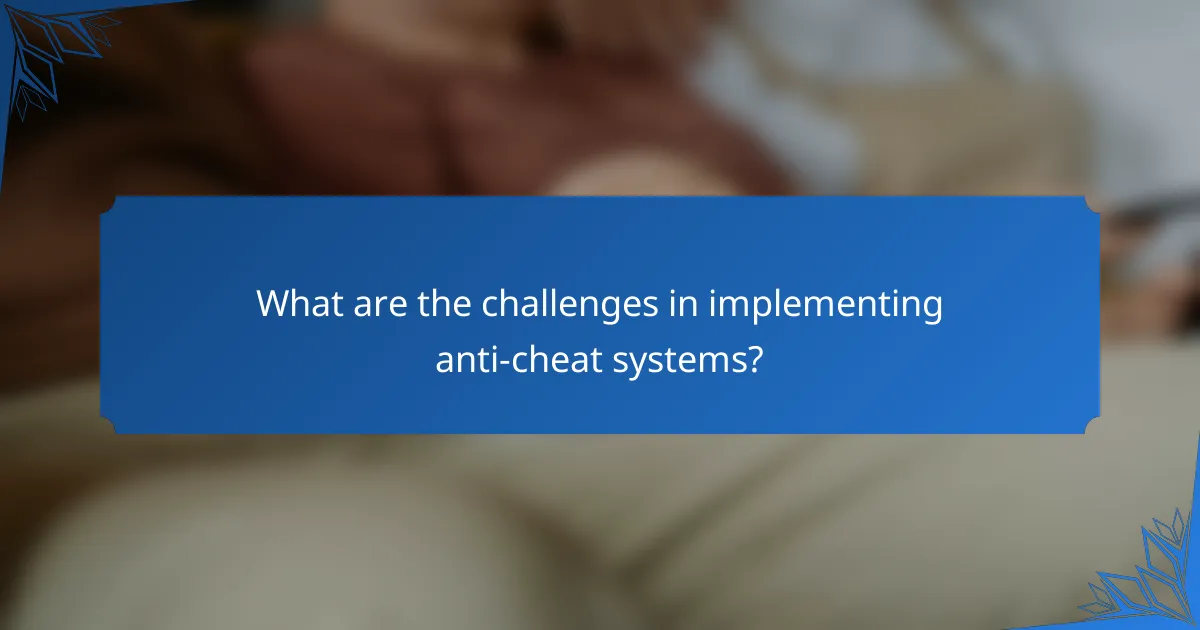
What are the challenges in implementing anti-cheat systems?
Implementing anti-cheat systems presents several challenges, including technical limitations, player backlash, and the cost of development. Each of these factors can significantly impact the effectiveness and acceptance of anti-cheat measures in gaming environments.
Technical limitations
Technical limitations refer to the inherent difficulties in creating robust anti-cheat systems that can effectively detect and prevent cheating without disrupting gameplay. Many systems struggle to keep up with rapidly evolving cheating techniques, which can include sophisticated hacks and exploits.
Moreover, anti-cheat software must operate with minimal latency to avoid affecting player experience. This balance between security and performance is crucial, as even slight delays can frustrate players and lead to negative feedback.
Player backlash
Player backlash occurs when anti-cheat measures are perceived as intrusive or unfair. Gamers often express concerns over privacy violations, especially when systems require extensive data collection to function effectively. This can lead to distrust and resentment towards the game developers.
Additionally, if players feel that the anti-cheat system incorrectly flags them as cheaters, it can result in significant frustration and loss of engagement. Developers must communicate transparently about how these systems work to mitigate backlash and maintain player trust.
Cost of development
The cost of developing anti-cheat systems can be substantial, involving not only financial investment but also time and resources. Creating a comprehensive solution requires skilled personnel, ongoing maintenance, and regular updates to adapt to new cheating methods.
For smaller game developers, these costs can be prohibitive, leading to a reliance on third-party solutions that may not fully align with their game’s specific needs. Budgeting for anti-cheat measures is essential, as neglecting this area can result in a compromised gaming experience and potential loss of player base.
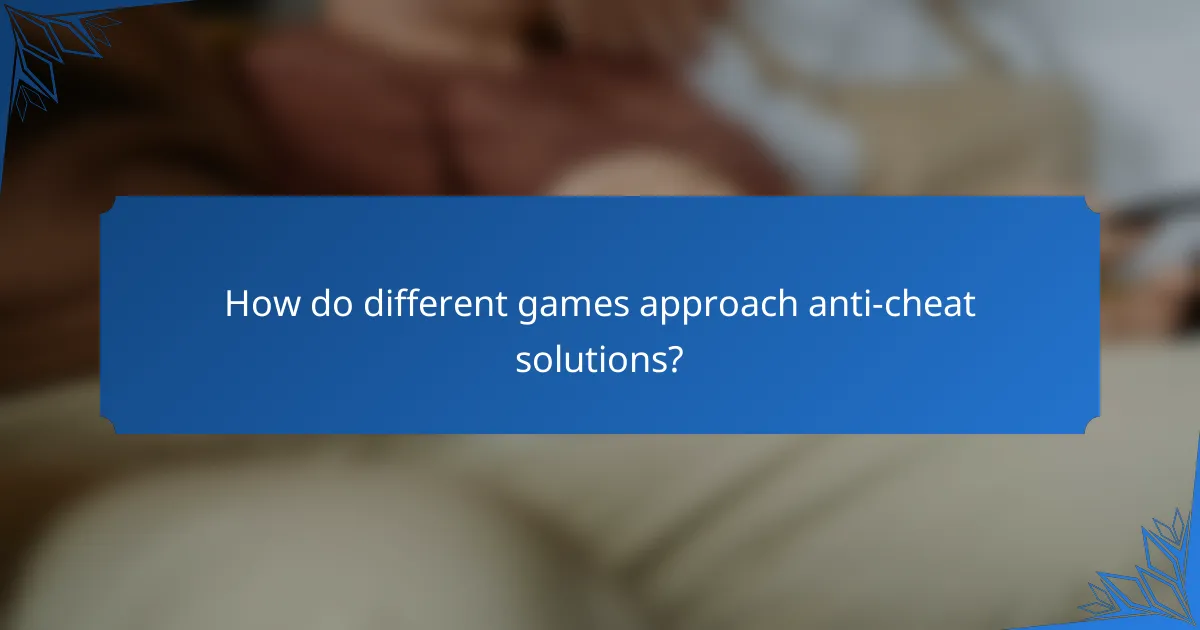
How do different games approach anti-cheat solutions?
Different games implement various anti-cheat solutions tailored to their specific environments and player bases. These methods range from software-based systems to community-driven reporting mechanisms, each with its strengths and weaknesses in maintaining fair play.
Fortnite’s Easy Anti-Cheat
Fortnite utilizes Easy Anti-Cheat (EAC), a software solution that detects and prevents cheating by scanning for known cheat programs and suspicious behavior. EAC operates in the background, allowing players to enjoy the game without noticeable interruptions while ensuring integrity.
One key aspect of EAC is its ability to update regularly, adapting to new cheating methods as they emerge. Players are encouraged to keep their game client updated to benefit from the latest security enhancements.
Call of Duty’s Ricochet system
The Ricochet anti-cheat system in Call of Duty employs a multi-faceted approach that includes kernel-level drivers to monitor player behavior and detect cheats. This system aims to identify and ban cheaters before they can disrupt the gaming experience for others.
Ricochet also incorporates player feedback and reports, allowing the community to contribute to identifying suspicious activities. Players should be aware that using unauthorized software can lead to permanent bans, emphasizing the importance of fair play.
League of Legends’ player reporting
League of Legends relies heavily on a community-driven player reporting system to combat cheating and toxic behavior. Players can report others for various infractions, which are then reviewed by automated systems and human moderators.
This approach not only helps identify cheaters but also fosters a sense of accountability within the community. Players should utilize the reporting feature responsibly, as false reports can lead to penalties for the reporter as well.
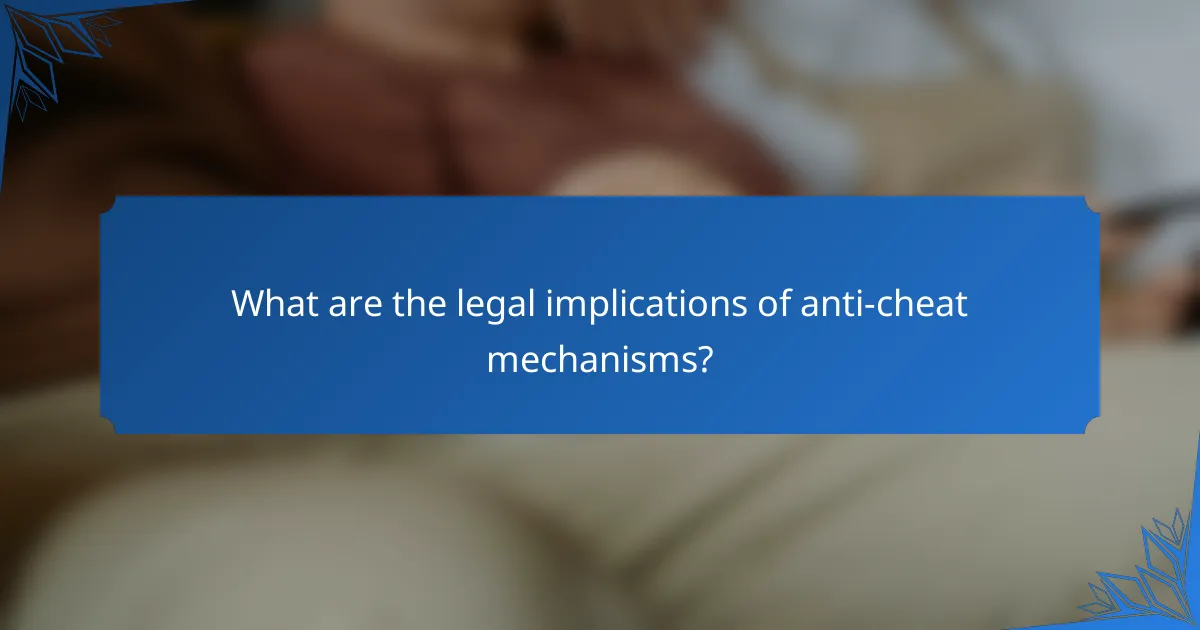
What are the legal implications of anti-cheat mechanisms?
Anti-cheat mechanisms can have significant legal implications, particularly concerning user privacy and compliance with regulations. These systems must balance effective cheating prevention with the protection of user data to avoid legal challenges.
Privacy concerns
Implementing anti-cheat mechanisms often raises privacy issues, as they may require access to personal data or system files. Players may feel uncomfortable with software that monitors their activities or collects sensitive information.
To mitigate privacy concerns, developers should clearly communicate what data is collected and how it will be used. Adopting transparent policies and obtaining user consent can help alleviate fears and ensure compliance with privacy regulations like GDPR in Europe.
Terms of service enforcement
Anti-cheat mechanisms are crucial for enforcing terms of service agreements, which typically prohibit cheating and unfair practices. When players violate these terms, anti-cheat systems can detect and penalize them, maintaining a level playing field.
Developers should ensure that their enforcement actions are consistent and well-documented. Clear communication regarding penalties, such as temporary bans or account suspensions, can help players understand the consequences of their actions and promote fair play.
